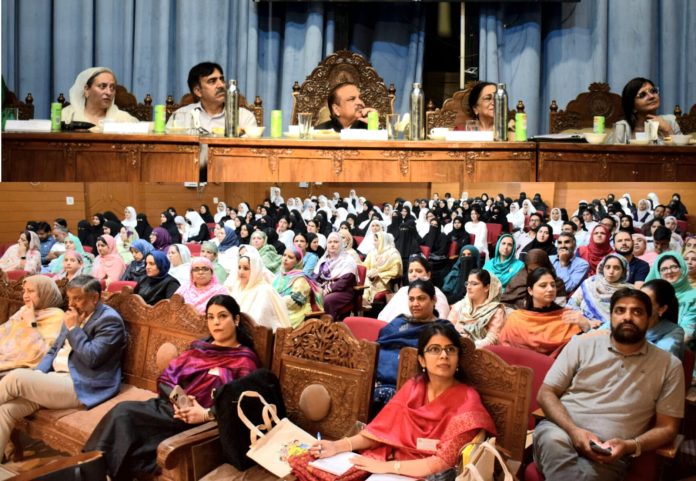SRINAGAR: A two-day workshop on exploring the strategies for prevention, support and redressal in sexual harassment cases at workplaces commenced today at Government College for Women (GCW), M.A. Road, here.
The workshop titled ‘Strengthening the Internal Committees for Zero Tolerance Campus’ is being organised by the Internal Committee of the host college in collaboration with WISCOMP (Women in Security, Conflict Management and Peace), New Delhi.
The workshop is being attended by IC members and gender champions of various colleges with participants discussing and learning to address and resolve complaints of sexual harassment at the workplace in line with the mandate of the Internal Committees under the POSH Act.
Vice Chancellor Cluster University Srinagar, Prof. (Dr.) Mohammad Mobin was the chief guest at the inaugural function of the workshop.
In his plenary address, Prof. Mobin emphasized the importance of strengthening Internal Complaints Committees in higher education institutions to create a safe and inclusive environment. He highlighted the need for modern tools and technology to enhance accessibility, transparency, and credibility in addressing sexual harassment cases.
Prof. Mobin shared experiences from some institutions, stressing the importance of awareness about what constitutes sexual harassment and the need for faith in the system. He suggested integrating digital platforms, online reporting mechanisms, and case tracking systems to make ICCs more robust and impactful.
Prof. Mobin also emphasized the importance of exemplary punishments for perpetrators and awareness programs for students and staff.
In her keynote address, Director WISCOMP, Dr.Meenakshi Gopinath stressed on the importance of developing a new language and approach to address issues of gender and equality, moving beyond traditional patriarchal structures. She highlighted the role of education in empowering women and promoting social change, citing examples of women who have made significant contributions in various fields.
Dr. Gopinath emphasized the need to challenge existing power structures and promote more inclusive and democratic leadership styles, particularly in higher education institutions. She stressed on the importance of empathy, humility, and self-awareness in leadership, particularly in addressing issues of sexual harassment and promoting a culture of respect and inclusivity.
Dr. Gopinath cited examples of women leaders who have demonstrated exceptional leadership qualities, emphasizing the need for leaders to prioritize empathy, inclusivity, and social responsibility.
Earlier in her welcome address, Principal of the host college, Prof. Yasmeen Farooq emphasized the importance of creating a zero-tolerance campus environment where issues of harassment are addressed promptly. She highlighted the college’s commitment to fostering a culture of sensitivity and awareness through training programs and workshops.
Prof. Yasmeen stressed the need for collective effort and collaboration to ensure a safe and supportive ecosystem for all students and faculty. She expressed gratitude to the ICC committee for organizing the workshop and hoped that the deliberations would lead to effective strategies for prevention, support, and redressal of grievances.
Dean Academic Affairs, Cluster University Srinagar, Prof. Nazir Ahmad Simnani congratulated the college for organising the workshop and hoped that the deliberations will help strengthenthe Internal Committees.
Earlier, Presiding Officer and senior faculty member of the host college, Prof. Majida Maqbool briefed the audience about the aims and objectives of the two-day workshop. She informed that workshop will include lectures, discussions, cases studies, role plays and group exercises, spread over different sessions covering important areas including gender justice, legal framework under Prevention of Sexual Harassment(POSH) Act, spectrum of harassment, role of theInternal Committee in ensuring campus with zero tolerance for sexual harassment and culture of engendering a campus.
A short video feature on workplace harassment was also showcased on the occasion.
During the first session of workshop, Dr. LatikaVashisht delved on the legal framework of the POSH Act.
In Session II, Dr. Meenakshi spoke on ‘Spectrum of Harassment: From victimhood to Agency’. She was assisted by Shilpi Shabdita and Akashleena Chakrabti. The session included an interesting group activity on ‘When Women Write Exhibition’.


